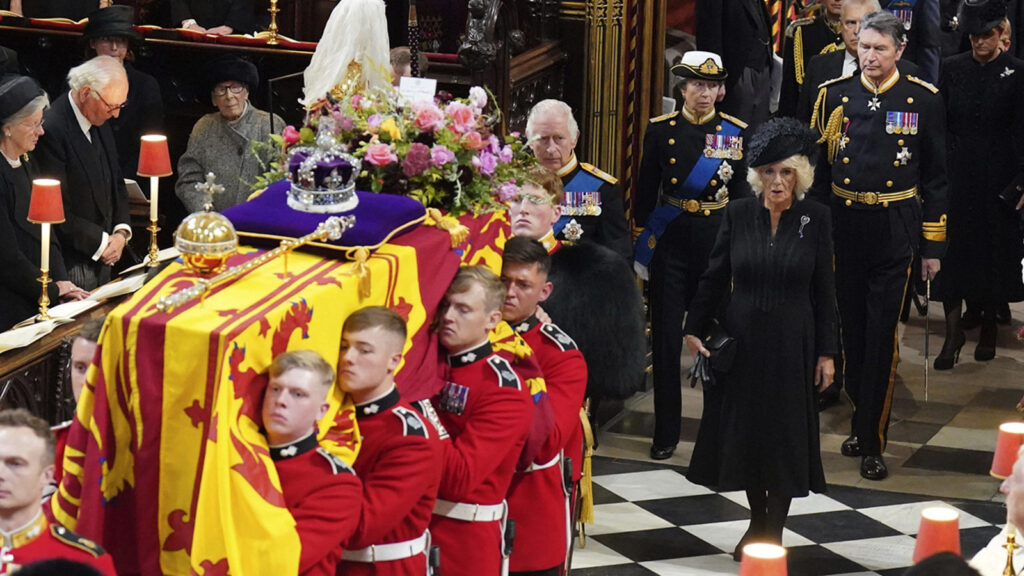Blog Post
Farewell to the Elizabethan Era
By Jonathon Van Maren
At 5:45 AM, I was in front of a laptop with my wife and two wide-eyed children to watch the funeral of her late Majesty Queen Elizabeth II. I had hoped to go to London when the time of her passing arrived, but having just returned from Ukraine and with a book tour in Ireland next month, we decided instead to watch the livestream with millions of others. It is still hard to believe she is gone, but there was her crown-topped casket, being carried solemnly into Westminster Abbey—the cathedral where she was married, where she (and every British monarch since William the Conqueror) was crowned, and which today received her mortal remains.
For days, hundreds of thousands of people filed past the Queen’s casket in Westminster Hall, the ancient, 11th-century building at the heart of Parliament and British history. I suspect that nobody living today could command those crowds and that she will be the last to receive such an outpouring of love and respect. The Elizabethan Era contained within it the end of Christian Britain, but the Queen’s funeral may be one of the most-watched declarations of the Christian message of all time (estimates indicate that over 4 billion people may watch). For years, the Queen faithfully used her Christmas message to convey her Christian beliefs. At her funeral—which the Queen planned herself—she reminded people of eternal truths one last time.
There were rumors that the service might be the sort of watered-down, ecumenical offering that the shambolic, drifting Church of England specializes in these days. But the Order of Service began with these words from the King James Version, which once shaped both the language and the very thoughts of generations of English speakers the world over:
I AM the resurrection and the life, saith the Lord: he that believeth in me, though he were dead, yet shall he live: and whosoever liveth and believeth in me shall never die. John 11: 25–26
I KNOW that my Redeemer liveth, and that he shall stand at the latter day upon the earth: and though after my skin worms destroy this body, yet in my flesh shall I see God; whom I shall see for myself, and mine eyes shall behold, and not another. Job 19: 25–27
The Choir of Westminster Abbey and the Choir of the Chapel Royal, St James’s Palace then sang:
Thou knowest, Lord, the secrets of our hearts; shut not thy merciful ears unto our prayer; but spare us, Lord most holy, O God most mighty, O holy and most merciful Saviour, thou most worthy Judge eternal, suffer us not, at our last hour, for any pains of death, to fall from thee. Amen. Henry Purcell (1659-95), Organist of Westminster Abbey 1679-95. The Book of Common Prayer 1549
I heard a voice from heaven, saying unto me, Write, From henceforth blessed are the dead which die in the Lord: even so saith the Spirit; for they rest from their labours. Amen. William Croft Revelation 14: 13
The singing was gorgeous. It struck me as I watched the readings and the liturgy and the choirs: there was nothing cheap or maudlin about this. It was not one of those modern funerals with post-modern pop music empty of any power or solemnity; not a mawkish “celebration of life.” It was a clear-eyed recognition of death, eternity, and the necessity of salvation through the Lord Jesus Christ before we make that final journey. Indeed, the new prime minister of the United Kingdom Liz Truss read the words of John 14:1-9 to the assembled leaders and dignitaries, a passage devoid of ecumenicism: “Jesus saith unto him, I am the way, the truth, and the life: no man cometh unto the Father, but by me.”
This is a foreign language to most now—even in the United Kingdom—but the Book of Common Prayer, the music, and the words of the King James are so very English. These are the jewels of her Christian inheritance, laid out once again for all to see at the Queen’s behest. As the readings were recited, the assembled leaders—most of whom believe not a word of it and despise those who still hold to the words of that Book—bowed their heads respectfully for a moment. They might not believe the words being read, but the Queen did. She had her last word in the Order of Service she helped to plan, and when her casket was borne from the cathedral, it was followed by three kings—her son Charles III, her grandson, who will likely be King William V, and her great-grandson, who will one day, if he lives, be King George VII.
It struck me as I watched the ceremony and solemnity and the pomp and pageantry that this is one reason people hate monarchy so much—because it is, where it still exists, inextricably intertwined with Christianity. That is why so many people feel that the Queen’s departure is the end of an era in more ways than one—because she lived as if she truly believed in the efficacy of the “hallowed anointing” she received at her coronation. The Queen’s funeral called forth the spirit of a different age, and many people found themselves feeling a peculiar longing for it as they realized that the virtues they were happy to mock and despise were actually going to be missed. Capel Lofft put it well at The Critic in his essay “The Queen contra modernity”:
I don’t wish to comment on the character of Diana — no doubt in many ways she was a kindly woman with good motivations. But a sort of caricature of the worst elements that could be extracted from her life, or perhaps more accurately her public image — making a spectacle of oneself, ostentatious virtue-signalling, a lack of emotional self-control — has become the model for our culture for 25 years now. One reason why the death of the Queen is so painful and seems to herald such uncertain and disquieting times is because, in our heart of hearts, we’ve all become sick of it. We saw in the Queen one last outpost of the old values that most of us endorse but struggle to emulate because they are counter-cultural and unpopular and difficult to stick to. We embraced a Diana culture whilst deep down we knew that the Elizabeth morality we were leaving behind was superior.
But goodbye to all that, I suppose. With the Queen gone, the monarchy is uniquely vulnerable to attacks from the post-modernists who wish to tear down one of the last bastions of history and tradition. I suspect that it will survive, but the war for the heart of the West has already been won by the Dianas and Harrys and Meghans of the world. Some, no doubt, will be secretly relieved that the Queen’s example can no longer condemn them by contrast. But for a moment today, the sordid reality show of endless personal pique and trading privacy and family secrets for cash was seen in the light cast by the sunset of the Elizabethan Age, and it looked as cheap and trashy as we all know it to be. We will miss the Queen more than we know.
For as the choir in Westminster sang so beautifully:
The day thou gavest, Lord, is ended, the darkness falls at thy behest; to thee our morning hymns ascended, thy praise shall sanctify our rest.
We thank thee that thy Church unsleeping, while earth rolls onward into light, through all the world her watch is keeping, and rests not now by day or night.
As o’er each continent and island the dawn leads on another day, the voice of prayer is never silent, nor dies the strain of praise away.
The sun that bids us rest is waking our brethren ‘neath the western sky, and hour by hour fresh lips are making thy wondrous doings heard on high.
So be it, Lord; thy throne shall never, like earth’s proud empires, pass away; thy kingdom stands, and grows for ever, till all thy creatures own thy sway.
***
Read reflections on the Queen’s passing and other pieces at our Substack.









Excellent piece. As an Englishman who has been practicing in the Buddhist tradition for the last 25 years, I found the service(s) profoundly moving. It was a magnificent display of the beauty and power of the Christian message. A wonderful last gift from Her Majesty to everyone. What a woman.